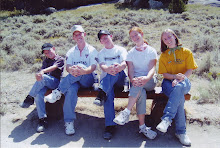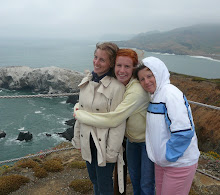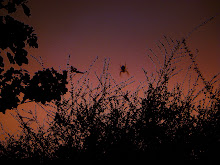Okay, it's not really, but I just really, really like that scene. (Name that movie, by the way...)
But these two poems are the two that I am deciding between to use for my final paper for Dr. Siegfried's class. And they're both lovely. Any preferences on which to use? They both fit the requirements I need them to fit, I think. I'm leaning toward the first one, but we'll see.
A LECTURE UPON THE SHADOW.
by John DonneSTAND still, and I will read to thee
A lecture, Love, in Love's philosophy.
These three hours that we have spent,
Walking here, two shadows went
Along with us, which we ourselves produced.
But, now the sun is just above our head,
We do those shadows tread,
And to brave clearness all things are reduced.
So whilst our infant loves did grow,
Disguises did, and shadows, flow
From us and our cares ; but now 'tis not so.
That love hath not attain'd the highest degree,
Which is still diligent lest others see.
Except our loves at this noon stay,
We shall new shadows make the other way.
As the first were made to blind
Others, these which come behind
Will work upon ourselves, and blind our eyes.
If our loves faint, and westerwardly decline,
To me thou, falsely, thine
And I to thee mine actions shall disguise.
The morning shadows wear away,
But these grow longer all the day ;
But O ! love's day is short, if love decay.
Love is a growing, or full constant light,
And his short minute, after noon, is night.
THE RELIC.
by John Donne WHEN my grave is broke up again
Some second guest to entertain,
—For graves have learn'd that woman-head,
To be to more than one a bed—
And he that digs it, spies
A bracelet of bright hair about the bone,
Will he not let us alone,
And think that there a loving couple lies,
Who thought that this device might be some way
To make their souls at the last busy day
Meet at this grave, and make a little stay?
If this fall in a time, or land,
Where mass-devotion doth command,
Then he that digs us up will bring
Us to the bishop or the king,
To make us relics ; then
Thou shalt be a Mary Magdalen, and I
A something else thereby ;
All women shall adore us, and some men.
And, since at such time miracles are sought,
I would have that age by this paper taught
What miracles we harmless lovers wrought.
First we loved well and faithfully,
Yet knew not what we loved, nor why ;
Difference of sex we never knew,
No more than guardian angels do ;
Coming and going we
Perchance might kiss, but not between those meals ;
Our hands ne'er touch'd the seals,
Which nature, injured by late law, sets free.
These miracles we did ; but now alas !
All measure, and all language, I should pass,
Should I tell what a miracle she was.










.jpg)






